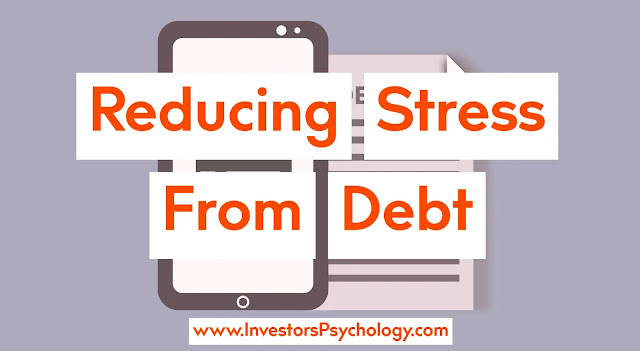Reducing Stress from Debt: How to Handle Financial Burdens
 |
Reducing Stress from Debt
Dealing with debt can be a stressful and overwhelming experience. Many individuals find themselves facing financial burdens that can cause anxiety, sleepless nights, and a constant sense of worry. This is nothing new to us at Investors Psychology. However, it's important to remember that you are not alone in this situation, and there are practical steps you can take to reduce stress and regain control over your financial well-being.
In this article, we will explore the 8 most effective strategies and practical tips on how to handle stress from debt - empowering you to navigate your financial challenges with resilience and confidence.
1. Face the Reality
This shouldn't come as a shock, but it needs to be said - the first step in reducing stress from debt is to confront the reality of your financial situation. Avoiding or denying the problem will only exacerbate your stress levels.
Take a deep breath, gather all your financial information, and create a comprehensive list of your debts, including balances, interest rates, and minimum payments. By facing the numbers head-on, you can gain a clear understanding of the scope of your debt and start formulating a plan to address it.
2. Develop a Budget
Creating a realistic budget is a crucial step in managing your finances and reducing stress. Start by analyzing your income and expenses, distinguishing between essential and non-essential expenditures. Identify areas where you can cut back and allocate more funds towards debt repayment.
A well-structured budget will enable you to prioritize your financial obligations and make steady progress towards debt reduction. Furthermore, avoid any further buying on credit or taking new loans. You obviously won't reduce debt by accumulating more.
 |
| Photo by Marcus Aurelius from Pexels |
3. Explore Debt Repayment Strategies
When it comes to tackling debt, it's important to explore different repayment strategies to find the one that suits your situation best. Two popular approaches include the snowball method and the avalanche method. The snowball method involves paying off the smallest debts first, while making minimum payments on the others. As each small debt is eliminated, you gain momentum and motivation to tackle larger debts.
On the other hand, the avalanche method focuses on paying off debts with the highest interest rates first, which can save you more money in the long run. Choose the approach that aligns with your financial goals and motivates you to stay on track.
4. Seek Professional Guidance
If your debt situation feels overwhelming or you're unsure about the best course of action, seeking professional guidance can provide valuable insights and support. Consider reaching out to non-profit credit counseling agencies or financial advisors who specialize in debt management.
These professionals can offer personalized advice, help negotiate with creditors, and provide you with tools and strategies to reduce your debt and alleviate stress.
5. Communicate with Creditors
Don't underestimate the power of communication when it comes to managing debt-related stress. If you find yourself struggling to make payments, reach out to your creditors and explain your situation. They may be willing to work out a temporary payment plan, reduce interest rates, or provide other options to help you get back on track.
Remember, creditors are often more understanding than you might think, especially if you demonstrate a genuine commitment to fulfilling your financial obligations.
6. Practice Self-Care
In the midst of financial stress, it's crucial to prioritize self-care. High levels of stress can negatively impact your mental and physical well-being, making it even more challenging to overcome your debt. Take time for activities that promote relaxation and reduce stress, such as exercising, meditating, practicing mindfulness, or engaging in hobbies you enjoy.
By nurturing your overall well-being, you can maintain a positive mindset and stay focused on your journey towards financial freedom.
7. Explore Additional Sources of Income
To accelerate your debt repayment efforts and alleviate stress, consider exploring additional sources of income. This could involve taking on a part-time job, freelancing, or starting a side business.
The extra income can be directed towards debt reduction, helping you make faster progress and instilling a sense of control over your financial situation.
8. Stay Positive and Patient
Honestly, reducing debt takes time and perseverance. It's essential to maintain a positive attitude and celebrate small victories along the way. Make sure you get over any lost money. Acknowledge any positive progress, even if it's slow, and remember that every step forward brings you closer to your goal of financial freedom. Patience is key when dealing with debt-related stress, as it allows you to stay focused on your long-term financial well-being.
 |
Conclusion
Facing the stress from debt can be challenging, but with the right mindset and proactive strategies, you can regain control over your financial situation. By confronting your debt, developing a budget, exploring repayment strategies, seeking professional guidance, communicating with creditors, practicing self-care, exploring additional sources of income, and maintaining a positive attitude, you can reduce stress and pave the way to a brighter financial future.
Remember, you have the power to overcome your debt and build a solid foundation for financial well-being.



